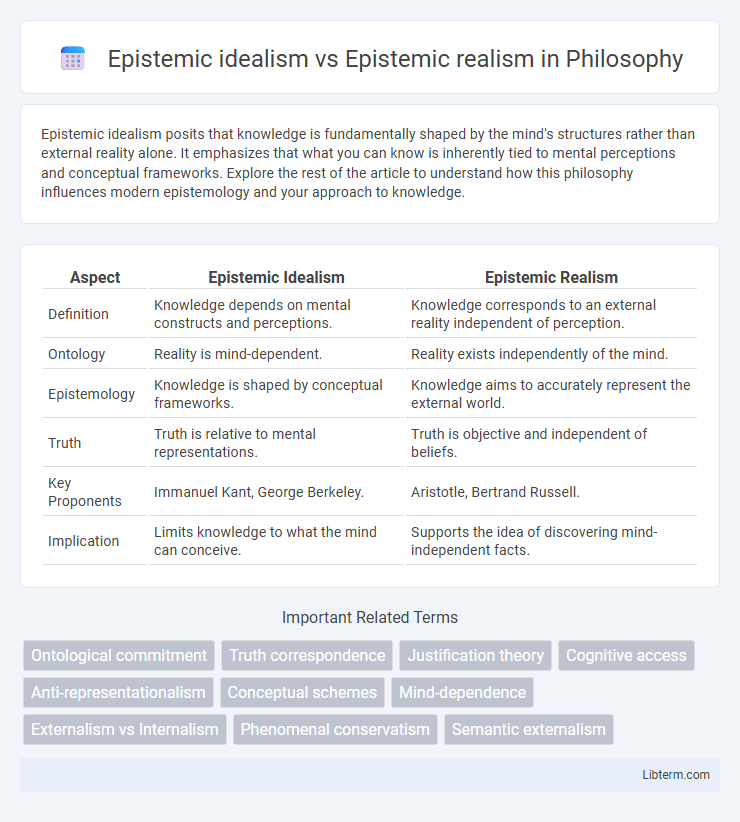Epistemic idealism posits that knowledge is fundamentally shaped by the mind's structures rather than external reality alone. It emphasizes that what you can know is inherently tied to mental perceptions and conceptual frameworks. Explore the rest of the article to understand how this philosophy influences modern epistemology and your approach to knowledge.
Table of Comparison
| Aspect | Epistemic Idealism | Epistemic Realism |
|---|---|---|
| Definition | Knowledge depends on mental constructs and perceptions. | Knowledge corresponds to an external reality independent of perception. |
| Ontology | Reality is mind-dependent. | Reality exists independently of the mind. |
| Epistemology | Knowledge is shaped by conceptual frameworks. | Knowledge aims to accurately represent the external world. |
| Truth | Truth is relative to mental representations. | Truth is objective and independent of beliefs. |
| Key Proponents | Immanuel Kant, George Berkeley. | Aristotle, Bertrand Russell. |
| Implication | Limits knowledge to what the mind can conceive. | Supports the idea of discovering mind-independent facts. |
Introduction to Epistemic Idealism and Epistemic Realism
Epistemic idealism asserts that knowledge is fundamentally shaped by the mind's conceptual framework, emphasizing that what we know is inseparable from the cognitive structures that interpret experience. Epistemic realism maintains that knowledge corresponds to an objective reality independent of our perceptions or conceptual schemes, asserting that truths exist whether or not they are known. The contrast between these positions revolves around whether the structure of knowledge is dependent on mental constructs or grounded in an external reality accessible through empirical investigation.
Defining Epistemic Idealism: Core Principles
Epistemic idealism asserts that knowledge is fundamentally shaped by the mind's conceptual framework, positing that all objects of knowledge are dependent on cognition or perception. This philosophical stance centers on the principle that reality as we know it is inseparable from our epistemic processes, emphasizing the mind's active role in constituting experience. Core principles include the rejection of a mind-independent world accessible without the interpretative lens of human understanding, highlighting the inseparability of knowledge and the knowing subject.
Key Tenets of Epistemic Realism
Epistemic realism asserts that knowledge corresponds to an objective reality independent of human perception, emphasizing that truths exist whether or not they are known. It holds that cognitive faculties can reliably acquire knowledge about the external world through empirical observation and logical inference. This framework supports the belief that evidence and reason lead to objective truths, affirming the mind-independent existence of facts.
Historical Development and Major Thinkers
Epistemic idealism, asserting that knowledge is fundamentally shaped by cognitive structures or mental frameworks, was prominently developed by Immanuel Kant in the 18th century, who argued that human perception actively organizes experience. Epistemic realism, championed by philosophers like John Locke and later scientific realists such as Carl Hempel, maintains that knowledge corresponds directly to an objective external reality independent of perception. The historical development of these positions reflects a shift from Enlightenment confidence in empirical observation to Kant's critical philosophy, which bridged rationalism and empiricism, influencing contemporary debates on the nature of knowledge and reality.
Comparative Analysis: Idealism vs Realism
Epistemic idealism asserts that knowledge is fundamentally shaped by the mind's conceptual framework, emphasizing the active role of perception and cognition in constructing reality. In contrast, epistemic realism holds that knowledge corresponds to an objective reality independent of mental states, prioritizing empirical verification and external evidence. Comparative analysis reveals idealism's strength in explaining subjective experience and coherence, while realism provides a robust foundation for scientific inquiry through its commitment to an independent external world.
Implications for Knowledge and Truth
Epistemic idealism posits that knowledge and truth are dependent on the mind's conceptual framework, implying that what we consider true is shaped by our cognitive structures and perceptions. In contrast, epistemic realism asserts that knowledge and truth exist independently of our beliefs or mental states, suggesting an objective reality that can be discovered and known. This divergence influences how certainty, evidence, and justification are evaluated, affecting epistemological theories and practices in philosophy and science.
Challenges and Criticisms of Epistemic Idealism
Epistemic idealism faces challenges related to its reliance on the mind's role in shaping knowledge, which critics argue leads to solipsism and undermines objective reality. Critics emphasize difficulties in accounting for independent external truths, questioning whether knowledge can be truly universal if contingent on cognitive structures. These critiques highlight the tension between subjective perception and the demand for epistemic justification grounded in a reality beyond individual cognition.
Objections and Debates Surrounding Epistemic Realism
Epistemic realism faces objections concerning the possibility of achieving objective knowledge independent of cognitive frameworks, with critics arguing that human perception and conceptual schemes inevitably shape what is considered "real." Debates center on whether epistemic realism can adequately account for the influence of social, historical, and linguistic factors on knowledge claims without collapsing into relativism. Proponents counter that epistemic realism provides a necessary foundation for scientific inquiry by asserting the existence of mind-independent truths accessible through rigorous epistemic methods.
Contemporary Perspectives and Applications
Contemporary perspectives on epistemic idealism emphasize the role of consciousness and mental constructs in shaping knowledge, arguing that reality is inseparable from our epistemic framework. In contrast, epistemic realism maintains that knowledge corresponds to an objective reality independent of human cognition, underpinning scientific inquiry and empirical methods in modern philosophy and cognitive science. Applications of these debates influence artificial intelligence development, theoretical physics, and the philosophy of mind by framing how knowledge acquisition and truth validation are approached.
Conclusion: Bridging the Divide in Epistemology
Epistemic idealism posits that knowledge is fundamentally shaped by the mind's conceptual framework, whereas epistemic realism asserts that knowledge corresponds to an independent external reality. Bridging the divide in epistemology involves recognizing that neither perspective fully encapsulates the complexity of knowledge acquisition, advocating for a hybrid approach that integrates the mind's interpretive role with objective features of the world. This synthesis fosters a more comprehensive understanding of epistemic justification and the dynamic interplay between perception and reality.
Epistemic idealism Infographic

 libterm.com
libterm.com